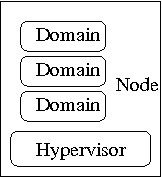Terminology and goals
To avoid ambiguity about the terms used, here are the definitions for some of the specific concepts used in libvirt documentation:
- a node is a single physical machine
- an hypervisor is a layer of software allowing to virtualize a node in a set of virtual machines with possibly different configurations than the node itself
- a domain is an instance of an operating system (or subsystem in the case of container virtualization) running on a virtualized machine provided by the hypervisor

Now we can define the goal of libvirt: to provide a common generic and stable layer to securely manage domains on a node. The node may be distant and libvirt should provide all APIs needed to provision, create, modify, monitor, control, migrate and stop the domains, within the limits of the support of the hypervisor for those operations. Multiple mode may be accessed with libvirt simultaneously but the APIs are limited to single node operations.
This implies the following sub-goals:
- the API should not be targeted to a single virtualization environment which also means that some very specific capabilities which are not generic enough may not be provided as libvirt APIs
- the API should allow to do efficiently and cleanly all the operations needed to manage domains on a node
- the API will not try to provide high level virtualization policies or multi-nodes management features like load balancing, but the API should be sufficient so they can be implemented on top of libvirt
- stability of the API is a big concern, libvirt should isolate applications from the frequent changes expected at the lower level of the virtualization framework
- the node being managed may be on a different physical machine than the management program using libvirt, to this effect libvirt supports remote access, but should only do so by using secure protocols.
- libvirt will provide APIs to enumerate, monitor and use the resources available on the managed node, including CPUs, memory, storage, networking, and NUMA partitions.
So libvirt is intended to be a building block for higher level management tools and for applications focusing on virtualization of a single node (the only exception being domain migration between node capabilities which involves more than one node).
